Healthiest Human Food For Dogs
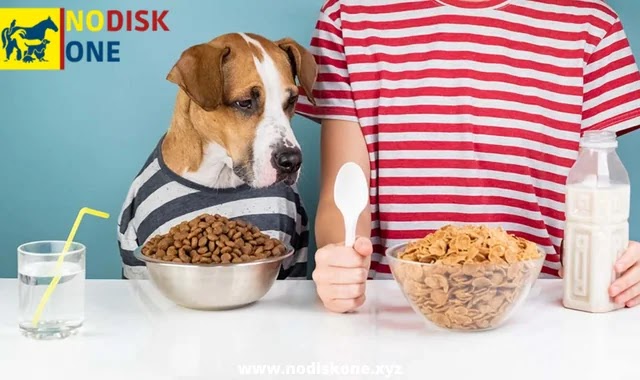
Every dog owner is conscious that a healthy diet is extremely important for your dog to develop and maintain a strong immune system. Diet and exercise go a long way in helping to keep your dog healthy, though they may not be able to prevent every illness. Many dog owners find it more convenient to feed home-cooked food. It might lessen their financial burdens and spare them the time and effort needed to buy dog food that has been prepared commercially. Because dogs have a different digestive system from humans, not all of the foods that humans eat may be suitable for dogs.
There is no guarantee that human food is safe for our dogs because it is good for us. There are many human foods that dogs should never eat, such as grapes and chocolate. However, some of the indulgent foods we enjoy can be equally delicious and nourishing for our canine companions. Popular foods that dogs can eat are listed below. While not all possible treats for your dog are included on this list, it can serve as a good starting point.
1. Oatmeal
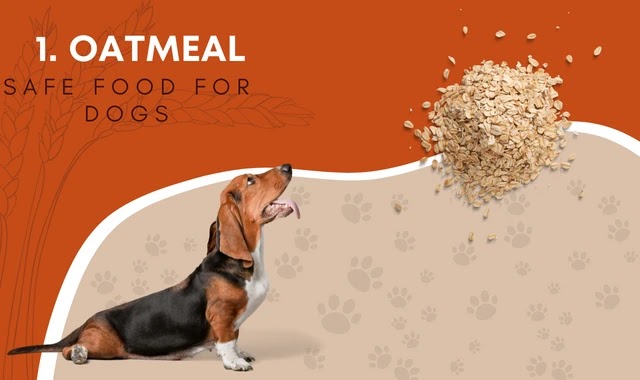 |
| Oatmeal |
Oatmeal is a safe food for dogs with wheat allergies and a good source of fiber, making it ideal for dogs who struggle with bowel irregularities. Check the label of the oatmeal before giving it to your dog. Offer only whole-grain oats devoid of flavoring or sugar. For a 20-pound dog, a serving size of about one tablespoon is suitable. Oatmeal should not be served in excess as it can cause gastrointestinal and weight problems. One of the best types of human food for your dog to eat is oatmeal. Additionally, it includes iron and vitamin B6. Oatmeal has low cholesterol and protects against heart disease.
Precaution
- Oatmeal should not have any flavors or salt added.
- Your dog's oatmeal shouldn't have any butter added.
- Oatmeal needs to be properly cooked; otherwise, it may cause your dog diarrhea or stomach issues.
- Dogs' stomachs may become upset by oatmeal cooked in milk.
- Before serving, let the oatmeal cool a little.
2. Peanut Butter
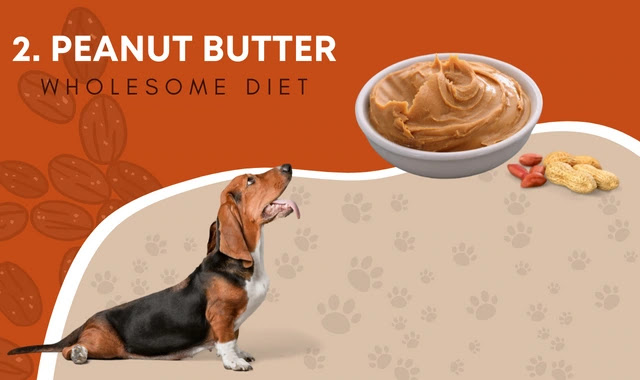 |
| Peanut Butter |
Proteins and vitamins, including vitamins B and E, can be found in peanut butter. This is a healthy and wholesome diet that you should feed your dogs. An occasional tablespoon of unsalted peanut butter for your dog is a treat you can both enjoy. It provides dogs with a lot of protein and essential fats. You can give peanut butter, either smooth or crunchy, to your dog.
Be sure the brand of peanut butter you choose doesn't contain salt. Because this can make your dog experience overly thirst and urination, and your dog can also get poisoning from sodium ions in the worst case. You must make sure the brand of peanut butter you give to your dog is free of xylitol. The rapid absorption of xylitol in dogs can cause a significant release of insulin as well as a potentially fatal drop in blood sugar levels.
Precaution
- No salt, sugar, or flavorings should be added.
- It is not favorable for dogs suffering from allergies.
- Small dogs and puppies should not be given it because it is a heavy diet and may cause digestion or stomach issues.
3. Flax Seeds
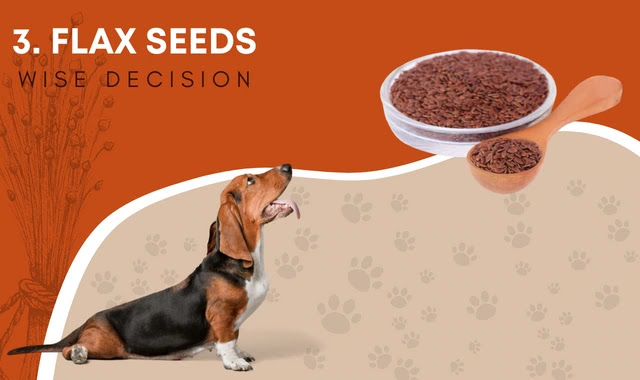 |
| Flax Seeds |
Flaxseed is the healthiest plant food for humans and is useful in treating a variety of risky infections and diseases like the risk of heart disease, cancer, stroke, and diabetes. It is also one of the best sources of omega acids and it is beneficial to a dog's skin. Giving your dog flaxseeds is a wise and healthy decision that will improve the shine of their coats, maintain healthy skin, and prevent allergies. Furthermore, it is fiber-free and has concentrated omega-3 fatty acids. Flaxseed may protect humans from developing breast cancer, prostate cancer, and colon cancer, according to recent studies.
Precaution
- In an airtight, dark container, store flaxseed oil or seeds in the refrigerator.
- Young puppies shouldn't be given it until they are 4 to 6 months old, depending on their breed and size, as it is not good for them.
4. Kelp
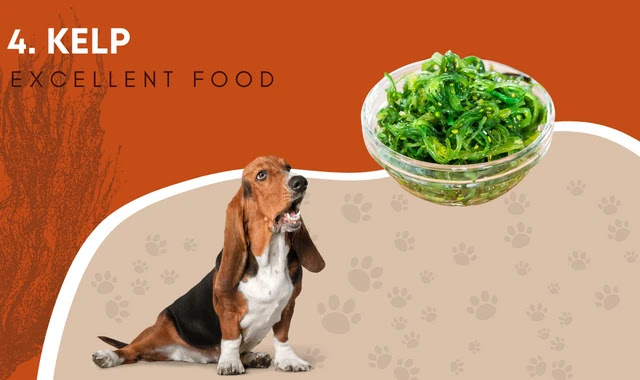 |
| kelp |
The brown algae-related sea vegetables known as kelps grow in "underwater forests" (kelp forests) in shallow oceans. Calcium and other minerals are abundant in kelp, making it an excellent food for maintaining a heart-healthy. Japan is the source of its commercial production. The discovery made by prehistoric tribes serves as a research framework for contemporary biochemical and food supplements for both humans and our pets. Iodine-rich kelp is a fantastic source for dogs and aids in flea and thyroid health prevention.
Precaution
- Overfeeding kelp to dogs can cause iodine toxicity, which can cause symptoms like watery eyes, a runny nose, and diarrhea in your dog.
5. Lean Meats
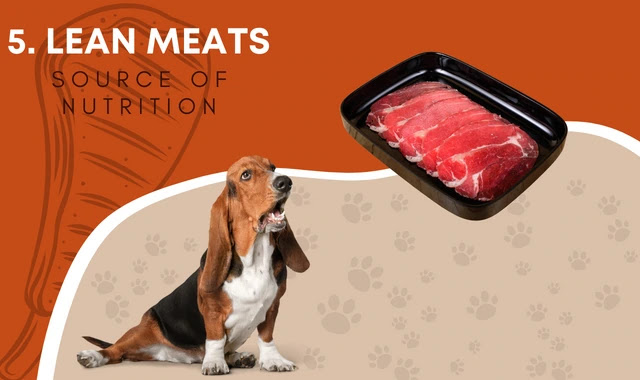 |
| Lean Meats |
Because they are carnivores and descended from wolves, dogs relied on raw meat as their main source of nutrition. As evidenced by sled dogs and racing hounds, many veterinarians continue to hold the view that real meat is the best food for your dog. They benefit from raw meat by developing stronger, healthier, and glossier hair and coat. However, there is a risk that bacteria will harm the dogs' health and that they could suffocate their bones. Therefore, feeding lean meat is preferable to feeding raw meat.
Precaution
- It is advisable to feed frozen or freeze-dried meat along with some vegetables and grains to avoid the negative effects of meat. This will create a balanced diet.
6. Salmon
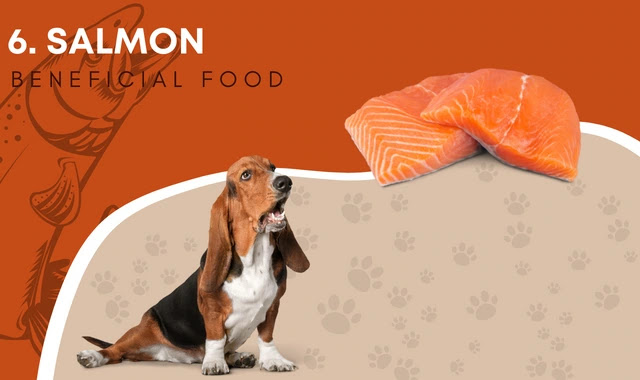 |
| Salmon |
Salmon fish are a good source of fatty acids such as omega 3, which is good for dog skin, enhances the shine of the dog's coat, and strengthens the immune system. Therefore, omega-3 fatty acids are beneficial for dogs. Additionally, salmon can be beneficial for dogs with allergies. But only salmon that has been poached, grilled, baked, or steam-cooked without any seasonings or additional oil should be offered to your dog. Salmon should never be given to dogs raw or undercooked. It is important to note that Salmon can contract a parasite that can poison dogs.
Precaution
- Salmon should not be fed raw or uncooked; adding salmon oil to his food is preferable.
- Don't feed your dog the skin of the salmon.
- Any fish should be checked for bones before eating because even tiny bones can harm a dog's internal organs or cause choking.
7. Yogurt
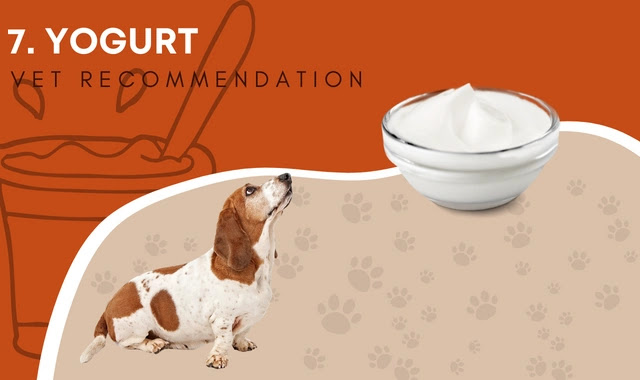 |
| Yogurt |
Plain Yogurt is a great treat for dogs because it is high in calcium and protein, especially if your dog has digestive issues. because it contains live bacteria that function as a probiotic and is beneficial to your dog's digestive system. Make sure to choose yogurts devoid of fruit, extra sugar, and artificial sweeteners like xylitol. Choose Greek or regular yogurt that is low in fat or fat-free to avoid adding extra fat, which can upset a dog's stomach. Don't give your dog any yogurt if they are lactose intolerant.
Precaution
- Yogurt should not have salt or sugar added.
- choose fat-free yogurt.
8. Cheese
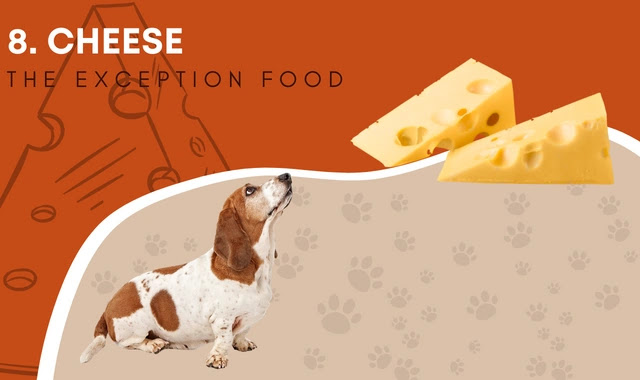 |
| Cheese |
In general, no dairy product is safe for dogs because milk and other dairy products are acidified for dogs, and adding the rennet enzyme causes coagulation and can result in high-fat content. However, cheese is an exception that can be fed in reasonable quantities and is healthy for them. By coagulating milk that contains protein and fat, cheese is formed. Therefore, cheese's ingredients are different from those of other dairy products.
Cheese can be a great addition to your dog's diet because this bland food is high in calcium and protein. However, if your dog has trouble digesting dairy, stay away from cottage cheese. As a treat, mix in one or two teaspoons of cottage cheese. Alternately, mix it with cooked rice and give your dog a small amount to settle an upset stomach.
Precaution
- Cheese is healthy for dogs when given in reasonable quantities, but it should not be given frequently as this can cause digestive issues like diarrhea.
- Cheese is bad for some dogs (a very small percentage) because they cannot tolerate lactose.
9. Egg
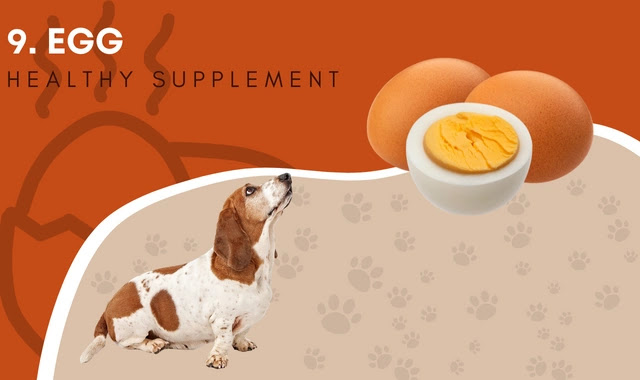 |
| Egg |
A healthy supplement to add to dog food is the egg, which is a good source of selenium and protein. However, raw egg isn't a healthy snack for your dog because they can lead to a biotin deficiency; you should only give them boiled or cooked eggs. Boiling eggs and serving them with rice is a good option if your dog has digestive problems because it gives them quick energy, easily digestible protein, and vitamins and minerals. However, egg yolks are high in fat and contain a lot of fat-soluble vitamins and minerals.
Precaution
- Giving dogs raw eggs is bad for them because it can cause a biotin deficiency, but you can give them cooked or boiled eggs instead.
- Because eggs are so high in protein and fat, you should only feed your dog the white of the egg if they are gaining extra weight.
- Never feed raw or undercooked eggs to your dog due to the potential for illness from Salmonella contamination.
10. Chicken Meat
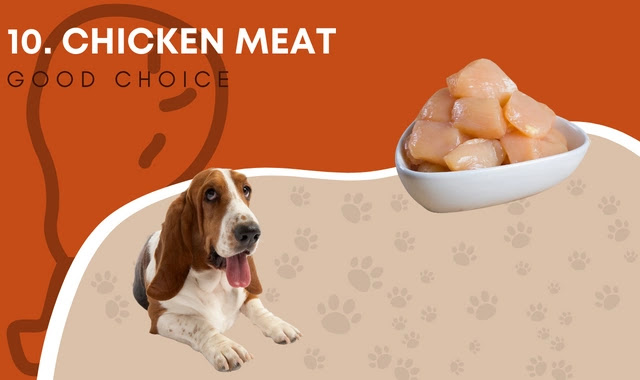 |
| Chicken Meat |
Different people have different perspectives on whether or not dogs should be fed table chicken. However, chicken bones are not recommended for dogs because they easily break and splinter, and the digestive system could be harmed as a result. But you can occasionally give them raw bone is good for their teeth and overall health. Cooked, unseasoned chicken is always a good choice for dogs and is simple to incorporate into their regular diet if they need more protein. The recommended serving size for baked, boneless chicken is a one-half ounce.
The same pathogens that people get from eating undercooked meat, like Salmonella, E. coli, and Listeria, can be spread by eating raw or undercooked meat, including chicken, according to the AVMA. So Ensure that you only give your dog chicken that has been thoroughly cooked. Additionally, it's crucial to confirm that your dog isn't allergic to chicken. Some dogs experience negative reactions to common allergens like chicken and protein.
Precaution
- Cooked chicken bones should not be fed.
- Chicken cooked in oil and spices shouldn't be fed to dogs because they can't digest them and get sick from diarrhea and acidity they cause.
11. Green beans
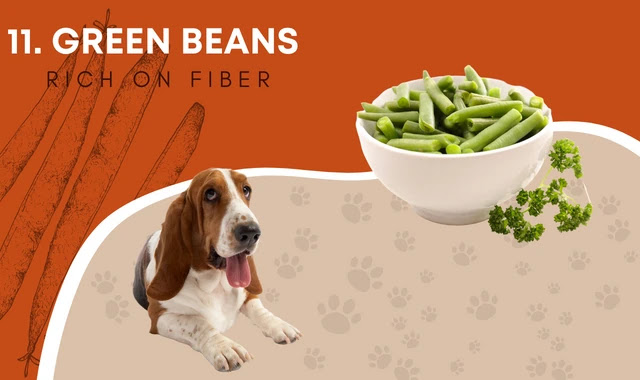 |
| Green beans |
The green bean is the best food for humans and dogs because it contains the most dietary fiber and contains the least amount of fat. Especially for a dog that is overweight, Fresh green beans have just 27.50 calories per cup. Additionally, it's a good source of magnesium and vitamins A, K, C, and E. These three vitamins have anti-cancer antioxidant properties. The majority of bean varieties contain lectins, a type of protein that, depending on the quantity, can be difficult for the digestive system. The best way to keep your dog safe is to make sure the green beans are fully cooked before serving them to him.
Precaution
- Dogs can consume green beans in small amounts, but they shouldn't make up their entire diet.
- Do not give your dog anything other than freshly cooked green beans or canned green beans without salt.
12. Carrots
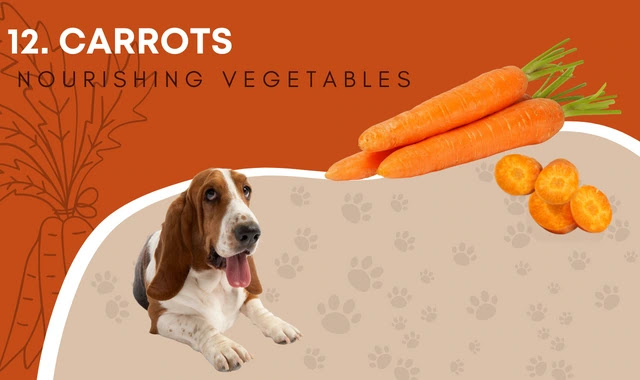 |
| Carrots |
Dogs can consume carrots as a healthy treat. Dogs enjoy chewing on carrots, and they are very nourishing vegetables. This vegetable has a lot of fiber and vitamins and is low in calories. Additionally, dogs who chew on carrots maintain dental hygiene by removing plaque, which is good for their teeth. Carrots contain beta-carotene, which offers essential vitamin A. Carrots are the most popular source of the antioxidant nutrient, which comes in a variety of forms and is beneficial to dogs, is carrots.
You might want to ask your dog's veterinarian how many carrots can be given to your dog each day. However, as a general rule, don't give your dog more than one medium carrot as a treat each day, in order to keep a healthy diet. Carrots can be served raw or cooked, but you must cut them into bite-sized pieces to prevent choking. A healthy food for both humans and animals is carrot.
Precaution
- Like humans, dogs can benefit greatly from eating carrots, but dogs find it difficult to digest uncooked vegetarian food. So we should give them boiled or steamed carrots.
- Dogs should not consume carrot leaves as they could be toxic.
13. Pumpkin
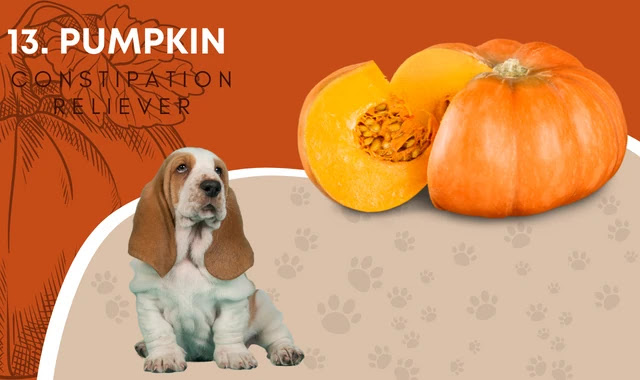 |
| Pumpkin |
The skin and coat of your pet will benefit from Pumpkin, which is a good source of fiber and vitamin A. It's not a good idea to feed your dog this recipe frequently, but you can occasionally add it to their regular food to provide an additional source of fiber and vitamin A. You can also serve your dog raw or canned pumpkin. It is advantageous because it is excessive for your dog's digestion and helps avoid constipation, particularly if your dog has a digestive issue. For constipation relief, you can add up to one to four tablespoons of pumpkin to a dog's regular canned food, depending on the size of the dog.
Precaution
Dogs benefit from pumpkin, which is one of the best foods for dogs who are suffering from diarrhea.
Your dog may experience acidic issues if you frequently feed him raw pumpkins.
Only canned pumpkin may be given to your dog, either as an ingredient or mixed into his regular food.
Pumpkin and pie must not be mixed.
14. Apple
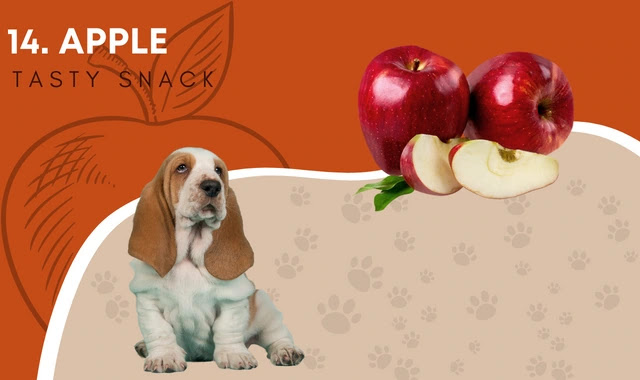 |
| Apple |
Dogs can benefit from apples in the same ways that humans can, but only in controlled amounts. Apples are a good source of calcium, vitamin A, vitamin c, vitamin k, fiber, and pectin for dogs. A few diced apple pieces make a tasty snack for dogs. Although cyanide poisoning from eating apple seeds is rare, it is best to reduce the risk by removing all of the seeds and core, Before giving your dog the fruit. Apples are a tasty, satiating, and calorie-efficient treat. The fact that apples help keep your dog's teeth healthy is an added bonus.
Precaution
- Apple seeds should not be fed to animals because they contain cyanogenic glycosides that can upset their digestion and have serious consequences if given in large quantities.
- Apple must only be given in small (limited) amounts because it contains no water and may upset the animal's stomach.
To the best of the author's knowledge, this article is accurate and true. It is not intended to serve as a replacement for a veterinary medical professional's formal and individualized advice, diagnosis, prognosis, treatment, or prescription. Animals displaying distress symptoms should be seen by a veterinarian right away.

Comments